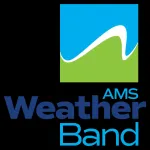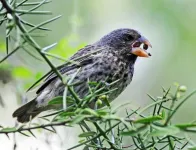(Press-News.org) The American Meteorological Society (AMS) launched its AMS Weather Band as a closed community for weather enthusiasts in 2020. To further its mission of public outreach and nurturing scientific engagement, the Society this month announced that it is re-launching Weather Band as a free resource, available to all. Since the Weather Band began in 2020, it has been a source of engaging, informative content related to weather, water, and climate science, aimed at the general public and weather enthusiasts.
This move makes a vast collection of resources and learning material available at no cost, aligning with AMS’s goal to further science education by connecting its expert members with the wider public. Over the past three years, the Weather Band has published over 400 articles, news items, story maps, and webinars with weather and climate experts.
The public can now access the full catalog, from “breaking news” webinars on Hurricanes Helene and Idalia, to conversations with storm chasers and authors, to seasonal weather reviews and community-generated notes about strange and unusual weather. New content continues to be added.
“By taking Weather Band public, we are making the expertise of our AMS members and our weather enthusiast community even more useful to you — whether you’re a teacher, a student, or simply interested in the latest meteorology and climate science,” says Claudia Gorski, AMS Director of Community Engagement. “We urge everyone to explore our archive, sign up for our Weather Band community newsletter, and consider what you’d like to see from us in the future!”
In addition to its webinars and other online content, the Weather Band hosts an annual weather photography competition and an annual, multi-day virtual conference (“Jamposium”). With a wide collection of fun, expert-created content on topics ranging from climate science to space weather, the Weather Band is an invaluable resource for enthusiasts, citizen scientists, and anyone curious about the weather. View all Weather Band content here.
About the American Meteorological Society
The American Meteorological Society advances the atmospheric and related sciences, technologies, applications, and services for the benefit of society. Founded in 1919, AMS has a membership of more than 12,000 professionals, students, and weather enthusiasts. AMS publishes 12 atmospheric and related oceanic and hydrologic science journals—in print and online; sponsors more than 12 conferences annually; and offers numerous programs and services. Visit us at www.ametsoc.org.
END
American Meteorological Society launches free content for weather enthusiasts with “Weather Band”
2024-10-10
ELSE PRESS RELEASES FROM THIS DATE:
Disrupting Asxl1 gene prevents T-cell exhaustion, improving immunotherapy
2024-10-10
(MEMPHIS, Tenn. – Oct. 10, 2024) Immunotherapy, using a patient’s own immune system to treat disease, has shown promise in some patients with cancer but has not worked in most. New research from St. Jude Children’s Research Hospital and colleagues found that disrupting Asxl1, a gene in T cells, improved sensitivity to a type of immunotherapy called immune checkpoint blockade and improved long-term tumor control in modes systems. The findings were published today in Science.
Cells of the immune system use “checkpoints” or signals that tell them how to react to diseased cells or pathogens. ...
How your skin tone could affect your meds
2024-10-10
RIVERSIDE, Calif. -- Skin pigmentation may act as a “sponge” for some medications, potentially influencing the speed with which active drugs reach their intended targets, a pair of scientists report in a perspective article published in the journal Human Genomics.
The researchers argue that a sizable proportion of drugs and other compounds can bind to melanin pigments in the skin, leading to differences in how bioavailable and efficacious these drugs and other compounds are in people with varying skin tones.
“Our review paper concludes that melanin, the pigment responsible for skin color, shows a surprising affinity for certain drug compounds,” ...
NEC Society, Cincinnati Children's, and UNC Children’s announce NEC Symposium in Chicago
2024-10-10
The NEC Society, Cincinnati Children's, and UNC Children’s are proud to announce the NEC Symposium in Chicago, September 7 - 10, 2025. As the world’s largest conference focused on necrotizing enterocolitis (NEC), the NEC Symposium will bring together key stakeholders to unite the global community for a world without NEC.
The NEC Society has organized the NEC Symposium biennially since 2017, with the most recent 2023 NEC Symposium engaging over 200 participants from nine countries and 35 U.S. states. The 2025 NEC Symposium in Chicago will bring together 300 clinicians, scientists, patient-family advocates, ...
Extreme heat may substantially raise mortality risk for people experiencing homelessness
2024-10-10
FOR IMMEDIATE RELEASE
Thursday, October 10, 2024
Contact:
Jillian McKoy, jpmckoy@bu.edu
Michael Saunders, msaunder@bu.edu
##
By nature of their living situation, people experiencing homelessness (PEH) are considered one of the most vulnerable populations to the health impacts of extreme weather.
PEH are particularly vulnerable to heat, and the impact of heat on mortality in this group is substantially greater than for the general population, according to a new study by Boston University School of Public Health (BUSPH).
Published in the American Journal of Epidemiology, the study examined mortality rates in two hot-climate US counties—Clark ...
UTA professor earns NSF grants to study human-computer interaction
2024-10-10
Fillia Makedon, a Distinguished Professor in the Computer Science and Engineering Department at The University of Texas at Arlington, has been awarded two new National Science Foundation (NSF) grants involving human-computer interaction. In one, she will study extended reality to assess attention levels in people with attention deficit hyperactivity disorders (ADHD); in the other, she will look at how human-robot interaction could help visually impaired persons perform job duties remotely from home using telerobotic technologies.
The NSF awarded ...
How playing songs to Darwin’s finches helped UMass Amherst biologists confirm link between environment and the emergence of new species
2024-10-10
Embargoed: Not for Release Until 2:00 pm U.S. Eastern Time Thursday, 10 October 2024
October 10, 2024
AMHERST, Mass. – They say that hindsight is 20/20, and though the theory of ecological speciation — which holds that new species emerge in response to ecological changes — seems to hold in retrospect, it has been difficult to demonstrate experimentally, until now. In research recently published in Science, biologists from the University of Massachusetts Amherst have identified a key connection between ecology and speciation in Darwin’s finches, famous residents of the Galápagos Islands, Ecuador. Prior work on these birds ...
A holy grail found for catalytic alkane activation
2024-10-10
An organic catalyst offers chemists precise control over a vital step in activating hydrocarbons.
Researchers at Hokkaido University in Japan have made a significant breakthrough in organic chemistry by developing a novel method to activate alkanes, which are compounds that play a crucial role in the chemical industry. The new technique, published in Science, makes it easier to convert these building blocks into valuable compounds, offering advances in the production of medicines and cutting-edge materials.
Alkanes are a primary component of fossil fuels and are also vital building blocks in the production ...
Galápagos finches could be singing a different song after repeated drought—one that leads to speciation
2024-10-10
Galápagos finches use their beaks to crush seeds and sing songs, so what happens to their musical trills when their beaks change to respond to new menus available under drought? Jeffrey Podos and Katie Schroeder found that the song might not remain the same after six cumulative future drought events that would likely reshape the finch beak. The projected changes in male mating songs could be so significant that they provide a pathway for ecological speciation, the researchers suggest. The researchers tested this idea by digitally modifying ...
Hidden “tails” slow marine snow, impacting deep sea carbon transfer and storage
2024-10-10
Newly discovered microscopic mucus tails – trailing from particles of marine snow particles – slow these particles’ descent into the deep ocean, research finds. This doubles the particles’ residence time in the ocean's upper layers and significantly alters estimates of how much carbon is sequestered in the deep sea. The oceans serve as a vast reservoir and critical sink for atmospheric carbon dioxide. A key process driving carbon sequestration in the ocean is the biological pump, where photosynthetic activity ...
Seed dispersal “crisis” may impact plant species’ future in Europe
2024-10-10
Europe is facing a seed dispersal “crisis,” due to extinction threats and population changes among the animals that do the seed dispersing, according to a new synthesis by Sara Beatriz Mendes and colleagues. Their literature review of animal and plant dispersal pairs helped them reconstruct the first European-wide seed dispersal network. Seed dispersal by animals is a critical part of maintaining healthy ecosystems, especially in fragmented environments like those found throughout Europe. Lack of seed dispersal to connect populations could prevent declining plant populations from ...






